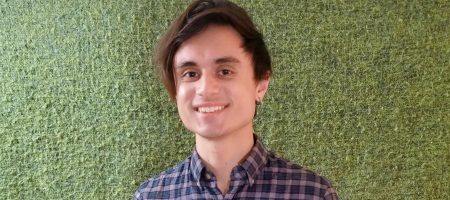Student Spotlight – Caleb Kealoha
Meet fourth-year undergraduate researcher Caleb Kealoha!
Caleb majors in Psychology and is in our Undergraduate Research Scholarship Program. The title of his research project is “We are (not) in Synch: Inter-brain Synchrony during Interpersonal Conflict.”
How did you first get interested in your research project?
In my first quarter as a transfer student at UCLA, I took a social psychology course with Dr. Matthew Lieberman. I quickly became enamored with this area of psychology, as I realized that I think about the world like a social psychologist. Wanting to learn more, I frequently attended Dr. Lieberman’s office hours and delved into the literature he recommended. Over time, he helped me develop my research interests and introduced me to the field of social neuroscience, a growing branch of social psychology that intersects with cognitive psychology and neuroscience. With Dr. Lieberman’s help, I have investigated a topic of research I find important: interpersonal conflict. My honors thesis project uses neuroimaging to identify the neural signatures of interpersonal conflict within face-to-face interaction.
What has been the most exciting aspect of your research so far?
Overseeing a research project from beginning to end has been a rewarding experience. Each step in the research process brings about a new challenge, and finding ways to overcome these challenges can be a very engaging process. The most exciting aspect of my research has been building the skills and knowledge that will help me succeed as a researcher in the field of social neuroscience. Also, getting to interface with our neuroimaging equipment—functional near-infrared spectroscopy (fNIRS)—has been really cool!
What has surprised you about your research or the research process?
I was surprised to find that successful researchers are jacks-of-all-trades. One minute you may play the role of a theorizer, connecting premise to premise to form a logical argument in support of the research question you are investigating. In the next moment, you might take on the role of a leader, managing a team of research assistants as they follow complex protocols to acquire data. In the same day, you might adopt the role of a writer or a public speaker, illustrating your work and conveying its importance to a broad audience. Navigating the research process feels like a constant interchange between different responsibilities, which I find enjoyable and have grown to love.
What is one piece of advice you have for other UCLA students thinking about doing research?
Take time to reflect on what drives you. Ask yourself, “What do I enjoy doing? What do I enjoy thinking about? Is there something in the world I want to know more about or fix? Is there a question I’ve always had that I haven’t seen anyone find an answer to?” Use these questions to guide the types of research opportunities you pursue. Research is a fun and fulfilling experience when you care about what you are researching! Instead of pursuing research for the sake of just having done research, pursue research that aligns with what you are passionate about and motivated by.
What effect do you hope your research has in your field, at UCLA, in your community, or in the world?
With my honors thesis project, I aim to find a reliable neural signature for interpersonal conflict, in hopes of using this neural signature in the verification and improvement of current conflict interventions and in the development of future conflict resolution strategies. In the future, my goal is to continue conducting research in social neuroscience that can be translated into increased understanding and collaboration between people of all identities and walks of life. UCLA has been integral to my development as a researcher, and I intend to represent UCLA as I continue forward with my aspirations in research.


